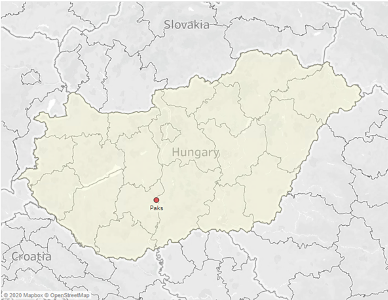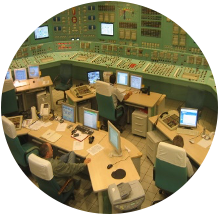Highlights
1,178 tHM spent nuclear fuel in storage (2013)
3,323 tHM spent nuclear fuel projected by 2050
1982 First year of commercial nuclear operation
4 operating nuclear power reactors
2 operating research and test reactors
2 GW(e) installed nuclear capacity (2017)
50.64% nuclear share of domestic energy production (2018)
Regulator: Hungarian Atomic Energy Authority
Power Operator: MVM Hungarian Electricity/MVM Paks

Management and Disposal of Spent Nuclear Fuel
Practices
- Before the Spent Fuel Interim Storage Facility (SFISF) was operational at Paks in 1997, Hungary sent all spent fuel (273 tHM) to the Soviet Union/Russian Federation for storage, reprocessing, and waste disposal
- Fuel is stored wet, then transferred to an interim modular vault dry storage
- The interim facility was expanded to have 33 vaults total and a maximum planned capacity of 17,743 fuel assemblies
- Only 1 research reactor has been refueled; all fuel from that reactor had been returned to the Russian Federation as of 2016
- Key R&D areas currently are decommissioning and waste management

Obligations
- Hungary acceded to Euratom’s IAEA safeguards agreement (INFCIRC/193) in 2007 and the additional protocol in 2007
- Hungary signed the Joint Convention in 1997 and ratified in 1998
- In 2015 and 2016, respectively, the National Policy and National Programme on the Management of Spent Fuel and Radioactive Waste passed to establish procedures for spent fuel management
- The policy does not yet include a long-term plan for final disposal but incorporates a “do and see” policy that emphasizes the need for research in advance for DGR possibilities while continuing to develop a disposal plan
- As of yet there are no plans to reprocess power reactor SNF but the research reactor fuel policy is to return foreign fuel to the Russian Federation (where waste is reprocessed)
- The Public Limited Company for Radioactive Waste Management (PURAM) is responsible for the operation of the existing radioactive waste and spent fuel management facilities and the preparation for the final disposal of high-level waste and the decommissioning of nuclear facilities


